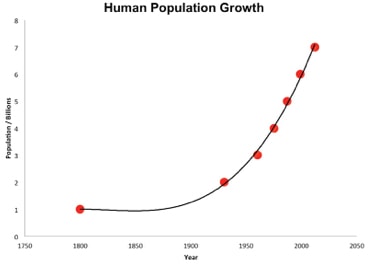Trash Talking Global Warming and Global Garbage Wars on Earth Day
There is only the wilting heat on our minds for the entire week, brains sweating away as Spring started on the 21st of March and we had World Earth Day (and World Water Day) on the 22nd. The brains shrinking under the searing temperatures that makes it too hard to think about the market-moving events – the Fed hike and hikes to come, the trade or cold wars, the #DeleteFB movement and the worse day for the S&P 500 during the month of March since 2009 or the 5th largest point drop in the Dow Jones Industrials in history or (how about this for the best one?) the 7th time since 1950 where the S&P has been down more than 2% on Thursday and Friday.
In other words, for us who were humbled by the markets 3 months ago, there is really not much to say except we feel sorry for the record US$ 43.3 bio pumped into US equity ETFs last week which lost about 6% in 7 days. They could have waited a week to buy cheaper.
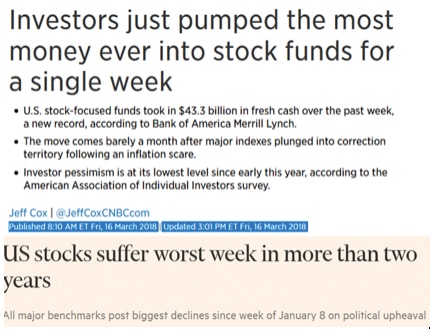 Headlines 1 week apart from the record inflow to be met with losses.
Headlines 1 week apart from the record inflow to be met with losses.
There is really not much to say or speculate about the trade wars that have not been finalised except that we know strawberries, cherries and pork bellies will be cheaper in Singapore in the days ahead! Whoopee.
In addition, we do not think it is good to talk about wars at all, trade or cold or real, after the Singapore Parliament passed a law to block electronic communications etc. on Wednesday.
The Global Garbage War?
For all the talk about trade wars, the US asked China on Friday not to implement a ban on imports of scrap materials so we have a global garbage war that broke out after China told the WTO last July that it would stop accepting shipments of rubbish as part of her campaign against “foreign garbage”.
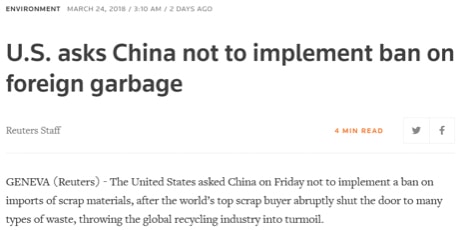 Source: Reuters
Source: Reuters
For all our trash talk last week on the ban on plastics, it does look like the problem shall be escalating in the days ahead especially for little Singapore which exports about 80% of her trash.
Shall we think twice before buying a new TV? Gosh, they are cheaper than ever these days and will we feel better after we drive over to the east side to Panasonic’s Heartland E-Waste Recycling Programme that is the only scheme that takes TV’s and vacuum cleaners. Bless Panasonic.
The new TV that comes with twice its volume in plastic, paper and Styrofoam packaging?
Well, as we said last week, we are eating, drinking and inhaling microplastics anyway. Granted that the effects of ingesting plastics are unknown so far, we should feel glad for the over 130 pilot whales that died in a mass beaching in Western Australia this week because they will not be suffering the fate of the sea turtle that died in agony after filling its stomach with various plastics and debris.
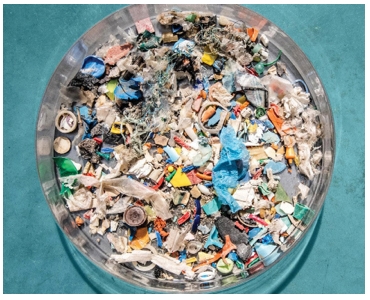 Stomach contents of a sea turtle; Source: NYTimes
Stomach contents of a sea turtle; Source: NYTimes
Ocean plastic has been predicted to triple within a decade according to a UK government study and the Scientific Reports journal has just published a study clarifying that the ocean’s garbage patch is now 4 to 16 times bigger than previously estimated
If we want to point the finger of blame, we need no look further than err, nearby, as the 5 largest contributors to ocean plastic waste are China, Indonesia, Philippines, Thailand and Vietnam.
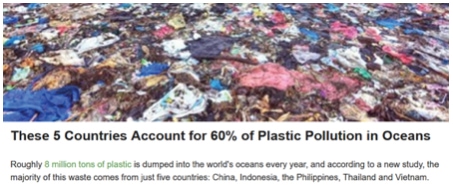 Source: Ecowatch
Source: Ecowatch
What Should We be Worrying About?
For our parts, our brains have been getting pretty choked up on the problems in our environment and the insufferable heat.
Is it plastic or oil or air pollution? Should we worry about eating plastic or global warming or food and water shortages, or polluted air?
We have decided to trash talk and trash out our concerns on the environment and the climate, distinct from weather (because Donald Trump cannot tell the difference), and perhaps we can derive some meaningful ideas for our investments and our children’s future.
The 7.3 Billion Reasons Why Plastic is Not the Biggest Problem
There are 7.3 billion answers to our environmental problems. Yes. 7.3 billion people on Planet Earth, a number that has grown exponentially since 200 years ago with the biggest rise coming in the past 50 years.
99% of them (not in the top 1%) have hopes and aspirations to improve their lot in life and we are lucky that 3 billion people live in poverty (less than $2.5 a day) and 1.3 billion of them live in extreme poverty (less than $1.25 a day) for them to meaningfully consume enough TVs, cars, phones and Coca-Cola to further dent the Earth’s depleting resources.
It is horrifying to imagine that oil is estimated to run out in 50 years and it just took us a century to use up all the crude oil that dead dinosaurs, animals, birds, fishes and plants took 4.5 billion years to decompose into and produce.
The consumption cannot end without risk to economic growth and we need to keep spending to ensure the capitalist mechanism keeps running and if the population does not grow, there goes real estate prices, for starters, although there is little to worry about because the 7.3 billion reasons will not go away anytime soon as lifespans continue to extend and we will have a projected human population of 9.5 billion by 2050.
Would we be worried about plastic in our drinking water then or having enough plastic-tainted water to drink, food to eat, decent air to breathe or oil to power the cars and, the Heavens forbid, battery power for our phones and the internet?
Plastic is just but a small part of the climate picture but it is the plastic bag we use that comes from oil that adds to the global warming picture that may mean our or our children’s penthouses will come under threat from rising sea levels.
There are 7.3 billion reasons why climate change and global warming will be worse and more “hard-felt” because if Houston’s population was what it was in 1940’s when they had their worst flood before 2017, the implications would be less drastic.
So it is climate change huh? In addition to the garbage wars, of course.
Yes. No climate, means no air, food or water, if we cannot change the problem of the exploding human population.
Do We Believe in Global Warming and the Climate Change Out of our Control?
Back in 2013, we wrote a cheeky piece on The Idiot’s Guide to Global Cooling Not Warming, and we still think the problem is in the exploding population although we have since come to see the light on the pollution problem.
Some of the interesting facts we unearthed.
The Earth was much hotter 1,000-2,000 years ago and even hotter during the Cretaceous period, a 100 million years ago in peak dinosaur era.
The atmospheric carbon dioxide levels, due to volcanic activity and the greenhouse effect, was so high that forests extended to the Arctic.
The Earth had 2 mini Ice-Ages back in 1645-1710 and 1790-1830 which coincided that a protracted period of very low levels of sunspot activities.
The climate change out of our control would be in the Milankovitch theory and the geomagnetic reversals in the Earth and the Sun as summarised in the picture below (because we are too lazy to type).
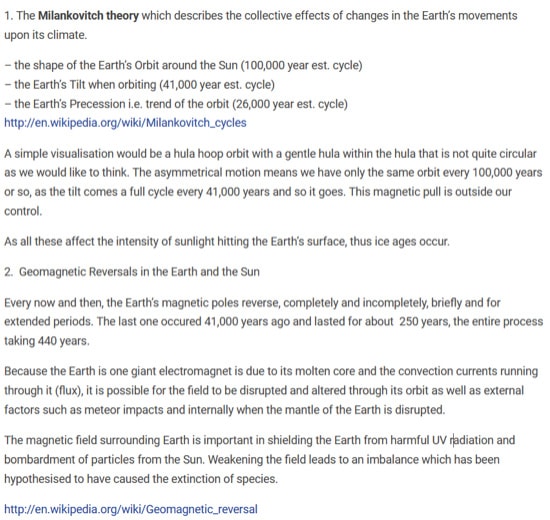 Source: Tradehaven
Source: Tradehaven
We also noted the scientific finding that the 23,000-year cycle of climate change has disappeared from the climate record of Earth some 3 million years ago. No more Ice Ages for now and just global warming to reckon with?
Is it fracking?
The fracking business and the obsession with shale oil and gas does disrupt the Earth’s mantle which results in temperature shifts deep in the ground which could possibly affect the magnetic core’s current flow within the Earth’s core in the years to come.
We have time at the moment, as scientists suggest that deep ocean waters are trapping vast stores of heat, buying us time or a hiatus from the worse to come.
 Source: Scientific American
Source: Scientific American
The Stuff We Cannot Deny
It is starting to show up in the world when we read about the latest Beast from Siberia battering the UK this Easter week, bomb cyclones, wildfires, hurricanes, winter storms and more in the past year.
Is it to do with the Arctic warming? For the Arctic was warmer than parts of the US this month as it melted in the dead of winter while southern Naples was blanketed in heaviest snow in 50 years.
80,000 reindeers, 22% of the total population, have starved to death between 2006-2016 as a result of wetter and warmer Arctic weather.
Chocolate (Cacao) is predicted to extinct by 2050 due to weather conditions, which is not a problem for chocolate-haters like us.
We have a trillion ton iceberg (size of 2 Luxembourg’s or size of Delaware), Larsson C, breaking off the Antarctica last July and another one off Pine Island, West Antarctica, in November. The Pine Island Glacier would raise sea levels by 1.7 feet if it all melted and Western Antarctica would raise sea levels by 10 feet if it disappeared.
We have 6 times more earthquakes than we are used to 40 years ago and all these 500-year storms happening around the world.
Has it anything to do with the abysmal heat in Singapore?
As atmospheric scientist, Jennifer Francis, said, “We tend to only see what’s out our own windows. In fact, the weather in one place is connected to what’s happening all over the world.”
So Much for Plastics and Yet for Plastics
It is too hard to imagine floods in this heat as we celebrate the 10th anniversary of the Marina Barrage that has seen us through some terrible floods as 2017 saw 14 flash floods, up from 10 in 2016 and 6 in 2015, based on incomplete information available on Wikipedia.
There are too many things out of our control but we do know that maximum temperatures in Singapore’s cool months are rising faster than warmer months and the mean annual temperature has risen from 1984 to 2017 at an average of 0.26 degrees per decade.
Singapore maybe hotter but Environment Minister Zulkifli has warned to expect more intense rainfall to be the norm in the future with climate change.
Better buy on high ground and away from those flood-prone areas that have no emergency drainage!
NASA has even rolled out a tool to predict how high seas will rise in your city if various glaciers melted.
Our key takeaway today is that climate change is within and also, largely, out of our controls. It just feels out of control because the global population is ballooning exponentially which makes it all the more devastating.
On the other hand, global resources are also depleting at an alarming rate which makes the sustainability picture look a tad bleak for us to hide behind the excuse that it will not happen in our lifetimes.
We can, however, do a bit to help and profit as well, besides buying flood-proof investment properties, the global garbage wars that are real.
Disposable plastics will soon be a thing of the past and we will do well to invest in those paper and alternative resources, in the cornstarch bowls and bamboo recyclables.
We can invest with a conscience, in green bonds and environmentally-conscious companies with environmental audit trails.
We can also buy less clothing than we need, an excuse people we know use to buy that 300 dollar Moschino t-shirt because they will only need 1 as opposed to a dozen Uniqlo T’s, or tweak our lifestyles for those little changes to make up for the pollution we cause by driving.
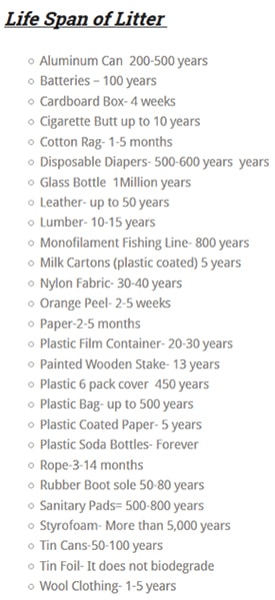 Biodegradability Checklist; Source: Greenecoservices
Biodegradability Checklist; Source: Greenecoservices
And just like the Butterfly-effect, while it may take a long time to clean up the plastics in the ocean, the connection will be real because climate change is real and the weather says so.
Happy Earth Day.

